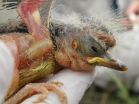(Press-News.org) FORT WORTH, TEXAS, USA, September 28, 2010—The outbreak of whooping cough in Texas, California, and other states this year underscores the critical importance of widespread vaccination coverage, both locally as well as around the world, said a leading global health official attending conferences on world affairs and immunization in Fort Worth this week.
Alex Palacios, a special representative of the GAVI Alliance, a public-private partnership aimed at increasing immunisation rates in poor countries, said that despite public health advances in the US and other wealthy countries over the last 60 years, regular diseases that have all but been eradicated can still threaten lives if immunization rates fall.
"Whooping cough, diphtheria and diseases that some of us don't even recognise anymore are not gone forever. They are widespread in developing countries and do also arise here in the US," said Palacios. "It is important that vaccine-preventable diseases are kept under control no matter where they crop up, whether it be in Texas or in Kenya. Diseases don't recognise borders."
Last year, 3,358 Texans had whooping cough, also known as pertussis, and three of them died. It was the highest number of cases in a half-century. So far this year, Texas has reported 1,783 cases. California has at least 4,017 cases of the highly infectious disease and is on track to break a 55-year-old record. Ohio has reported 1,019 cases. In contrast, in Kenya last year, there were an estimated 1,900 deaths due to pertussis; 7,500 deaths to rotavirus, a diarrheal disease; and 36,000 deaths due to pneumonia and influenza.
Anna Dragsbaek, President and CEO of The Immunization Partnership, said that Texans should be concerned about outbreaks of vaccine-preventable diseases anywhere in the world.
"As long as there is polio and other vaccine-preventable diseases in the world, outbreaks are only a plane flight away," she said. "It may seem like it's safe to be complacent. But in actuality, diseases such as whooping cough and measles arise only because we have been complacent. We are still all at risk because not enough people are immunized worldwide. The health of people in developing countries matters to Texas.''
Vaccination of children and adults can prevent pertussis. The pertussis vaccine is given along with diphtheria and tetanus vaccines in the same shot (called DTaP) for children. DTaP cannot be given to babies less than six weeks old or to anyone seven years of age or older. After that, children and adults are given a booster shot.
Experts say that the lack of vaccine coverage among adults in the US is the main reason for the upsurge in the last two years of whooping cough. Infants, who are too young to be fully immunized against the illness, are at particular risk. Health officials recommend that parents and caretakers receive booster shots to extend their immunity to the disease and lower the risk to babies.
Palacios and Dragsbaek will speak on the global state of immunizations at the Texas Immunization Summit 2010 in Fort Worth on September 30th, hosted by The Immunization Partnership and sponsored by St. David's Foundation. Palacios will give a keynote address over lunch on "The Global Health Equity Challenge: New Vaccines Against Pneumonia and Rotavirus" on October 1st. He will also be speaking at a World Affairs Council of Dallas/Fort Worth event on "Saving the Future: Global Efforts to Reduce Child Mortality" on September 30th.
Last week at the United Nations Summit on the Millennium Development Goals in New York City, global political leaders endorsed immunization of the world's children as one of the priorities to saving lives and improving health.
Palacios, who attended the UN Summit, said people everywhere, including in the United States, will be affected by the outcome of discussions about stopping vaccine-preventable diseases around the world.
"There is the potential to save four million lives over the next five years if we can immunize a significant number of the world's poor children against the two biggest childhood killers: pneumonia and diarrhea," he said.
He noted that the GAVI Alliance requires $4.3 billion in order to introduce the vaccines.
In its first 10 years, with funding from the Bill & Melinda Gates Foundation and the United States and other nations, GAVI has helped to deliver vaccines to more then 250 million children, an investment that is expected to save 5.4 million lives in the poorest nations.
In the last decade, despite the progress of developing countries in using more childhood vaccines, an estimated eight million children died from pneumococcal disease, a leading cause of pneumonia and meningitis, and five million children died from rotavirus, the major cause of severe diarrhoea among young children that is most deadly in poor nations. Experts predict that the introduction of the two vaccines can eventually save the lives of one million children per year.
"Vaccines are great value for money, and their impact is measured in the number of children whose lives we can save," said Palacios.
INFORMATION:
The GAVI Alliance is a Geneva, Switzerland-based public-private partnership aimed at improving health in the world's poorest countries. The Alliance brings together developing country and donor governments, the World Health Organization, UNICEF, the World Bank, the vaccine industry in both industrialised and developing countries, research and technical agencies, civil society, the Bill & Melinda Gates Foundation and other private philanthropists. GAVI support consists of providing life-saving vaccines and strengthening health systems. Since 2000, more than 250 million children have been vaccinated and over five million premature deaths averted thanks to GAVI-funded programmes.
END
More than half of all people are hosts to Candida albicans in their bodies. This species might be located on their skin or mucous membranes or in the intestines – frequently without causing any symptoms. However, it can be dangerous to patients whose immunological system has been weakened such as after organ transplants or chemotherapy with cancer. Then, this fungus penetrates into deeper layers of tissue and uses the blood system to spread throughout the body. In Germany alone, several thousand people die from systemic candida infections every year.
But why does Candida ...
Sept. 28, 2010 -- A new report from the National Research Council says that more organized and systematic procedures for gathering and evaluating data on Missouri River sediment are required to improve decisions and better manage the river's ecosystem, including protecting endangered species and developing water quality standards. In addition, the report finds that the U.S. Army Corps of Engineers' projects to restore habitats along the Missouri River are not significantly changing the size of the oxygen-depleted "dead zone" in the Gulf of Mexico, nor will options for ...
Just imagine your car suddenly comes to a halt on a quiet country road, and it's only four years old. This is not a pleasant thought. A breakdown is expensive. Not to mention the safety risk to the occupants – because the breakdown was caused by the extremely light plastic wheels so highly praised by the car salesman. One of them has broken. »Such a scenario must, of course, never happen in reality,« states Prof. Dr.-Ing. Andreas Büter from the Fraunhofer Institute for Structural Durability and System Reliability LBF in Darmstadt. The experts there specialize in operational ...
A Wildlife Conservation Society (WCS) study on nesting birds in Argentina finds that increasing temperatures and rainfall—both side effects of climate change in some parts of the world—could be bad for birds of South America, but great for some of their parasites which thrive in warmer and wetter conditions.
The study, which looked at nesting forest birds in Santa Fe, Argentina, found that increases in temperature and precipitation produce a bumper crop of parasitic fly larvae of the species Philornis torquans, parasites that burrow into the skin of baby birds to feed. ...
A new study by USC researchers reveals that stressed men looking at angry faces had diminished activity in the brain regions responsible for understanding others' feelings.
Turns out the silent and stoic response to stress might be a guy thing after all.
"These are the first findings to indicate that sex differences in the effects of stress on social behavior extend to one of the most basic social transactions — processing someone else's facial expression," said Mara Mather, director of the Emotion and Cognition Lab at USC.
In an article appearing the October 6 issue ...
Sept. 28, 2010 — The National Research Council today released its assessment of U.S. doctoral programs, which includes data on over 5,000 programs in 62 fields at 212 universities nationwide. The assessment is designed to help universities evaluate and improve the quality of their programs and to provide prospective students with information on the nation's doctoral programs. (See Full Report)
"This report and its large collection of quantitative data will become in our view an important and transparent instrument for strengthening doctoral education in the United States," ...
Being allergic to dogs or cats may worsen your ragweed allergies, according to a study from Queen's University.
Researchers found that people with pet allergies often develop ragweed allergy symptoms more quickly than others. But the study also suggests that once allergy season is in full swing, those symptom differences subside.
The team, led by Anne Ellis, an assistant professor in the departments of medicine and microbiology & immunology, exposed 123 participants to ragweed, and noted that pet allergy sufferers reported symptoms differently than their non-animal ...
PITTSBURGH—In the first population-based survey to indicate a racial disparity in the psychological abuse of senior citizens, University of Pittsburgh researchers found that African American seniors could be twice as likely to be mistreated than elders of other races. The survey also revealed that African American elders could be up to five times more susceptible to being swindled. Reporting the survey results in The Gerontologist, the researchers urged that health care and social service workers be especially vigilant for the possible mistreatment of African American seniors.
Lead ...
WEST LAFAYETTE, Ind. - Researchers have created a computer model that predicts how a disaster's impact on critical infrastructure would affect a city's social and economic fabric, a potential tool to help reduce the severity of impacts, manage the aftermath of catastrophe and fortify infrastructure against future disasters.
"The model works for any type of disaster that influences the infrastructure," said Makarand Hastak, head of construction engineering and management and a professor of civil engineering at Purdue University. "If we can identify in advance the most ...
In a recent keynote address before the Kavli Science Forum: 2010 in Oslo, Dr. John P. Holdren -- science advisor to U.S. President Barack Obama -- provided insight into why climate change is a priority to the Obama administration, and pressed the need for an international effort to mitigate, and adapt to, what he termed the effects of "global climate disruption."
"We cannot solve the great problems of our time alone - any of us - as individual nations," he stated. "We need to solve them together, and science and technology pursued together are going to be immensely important ...


